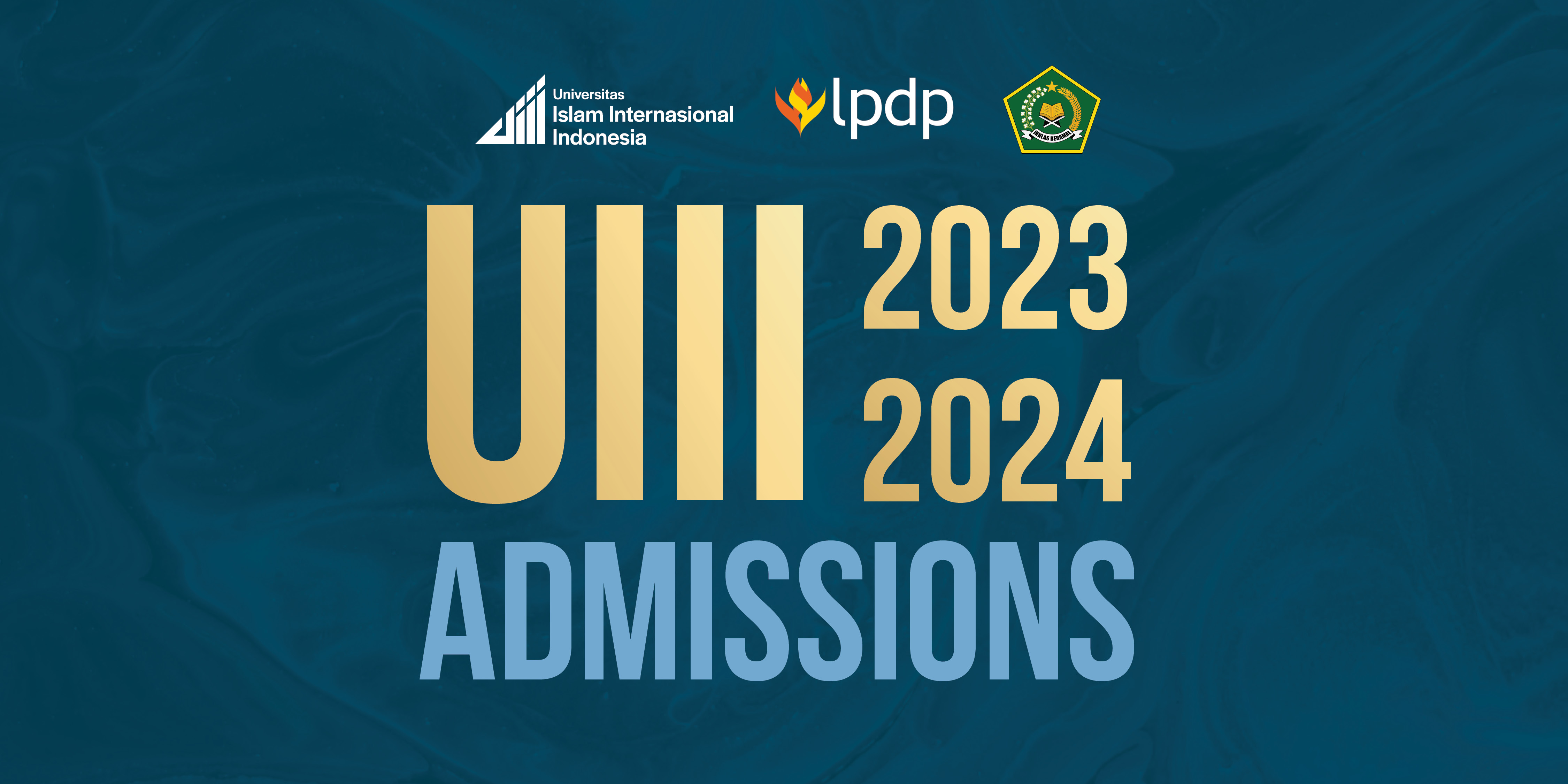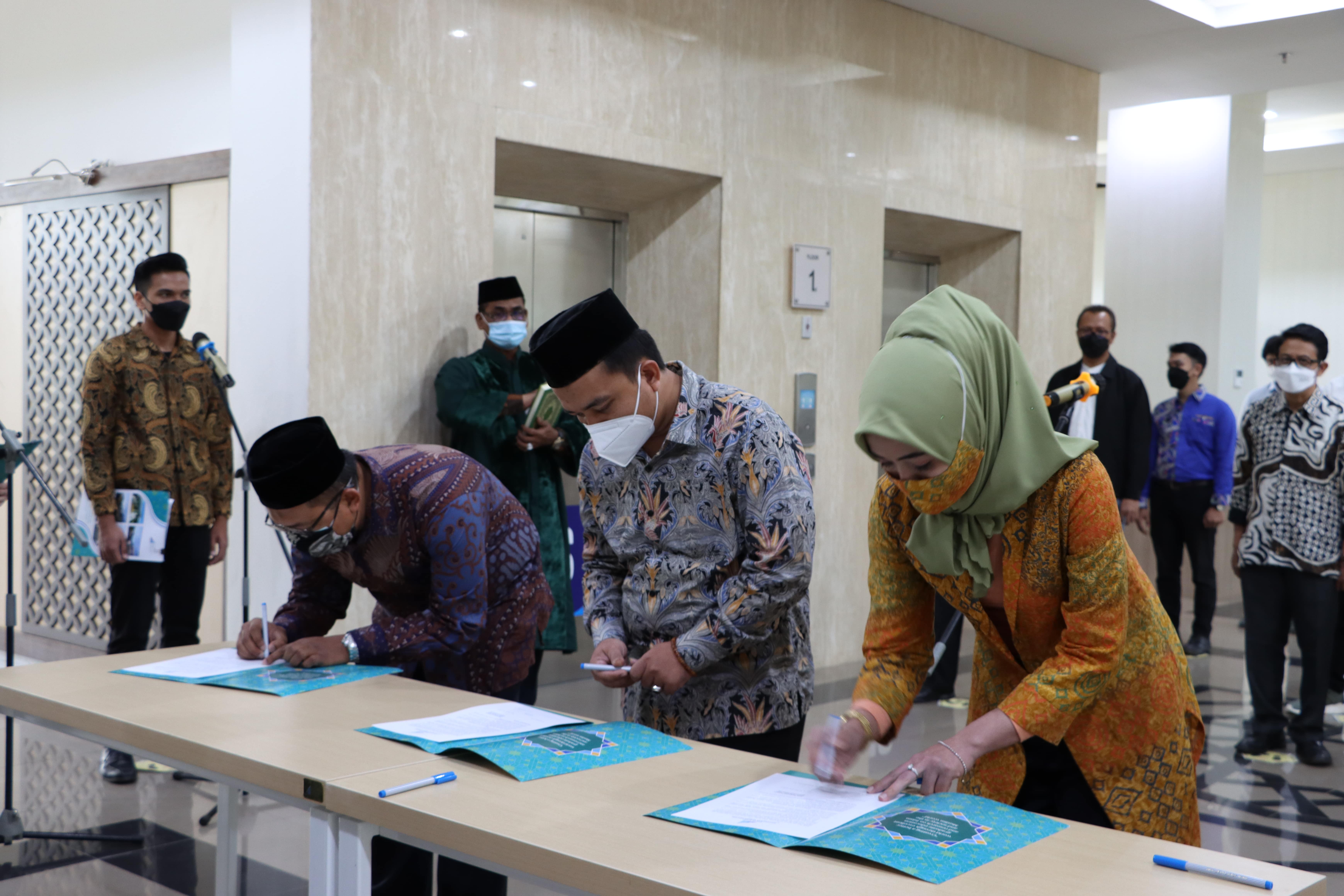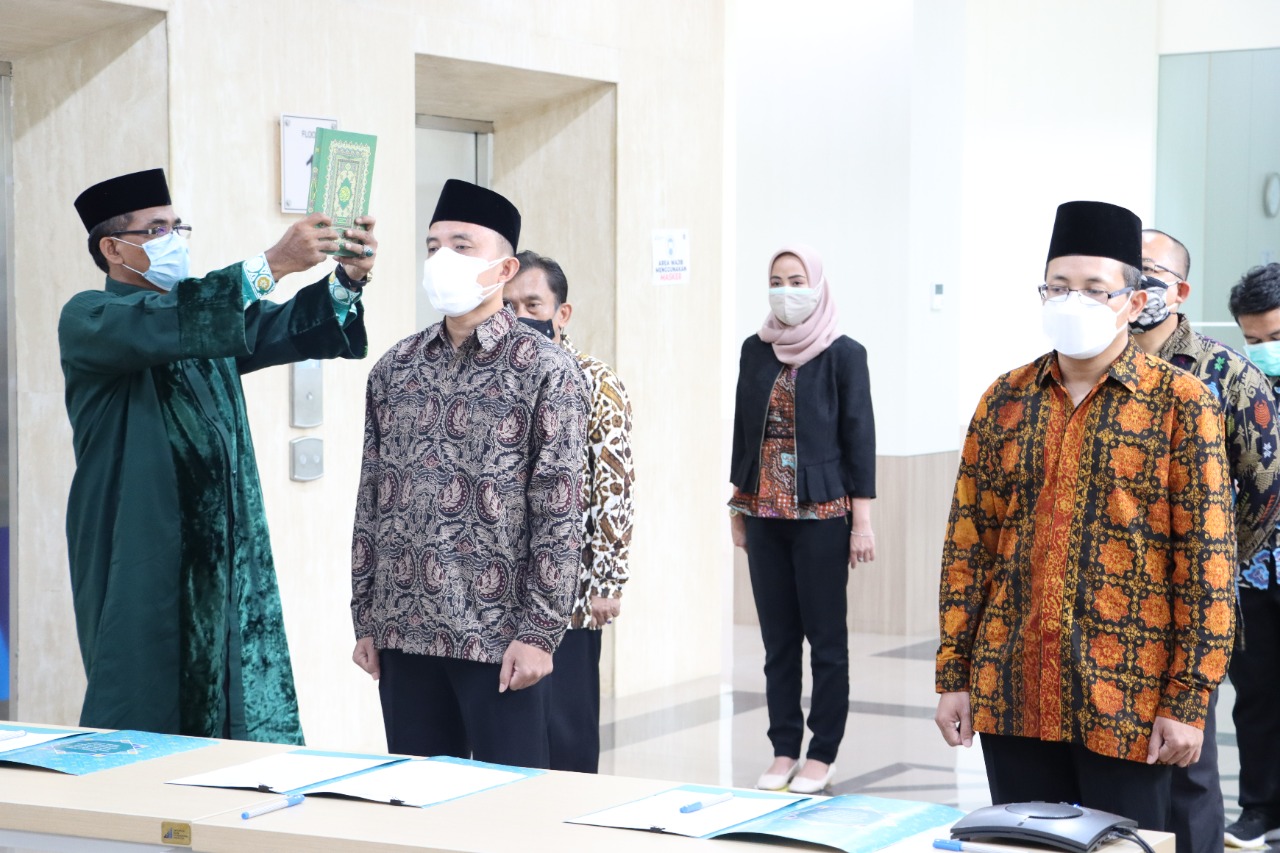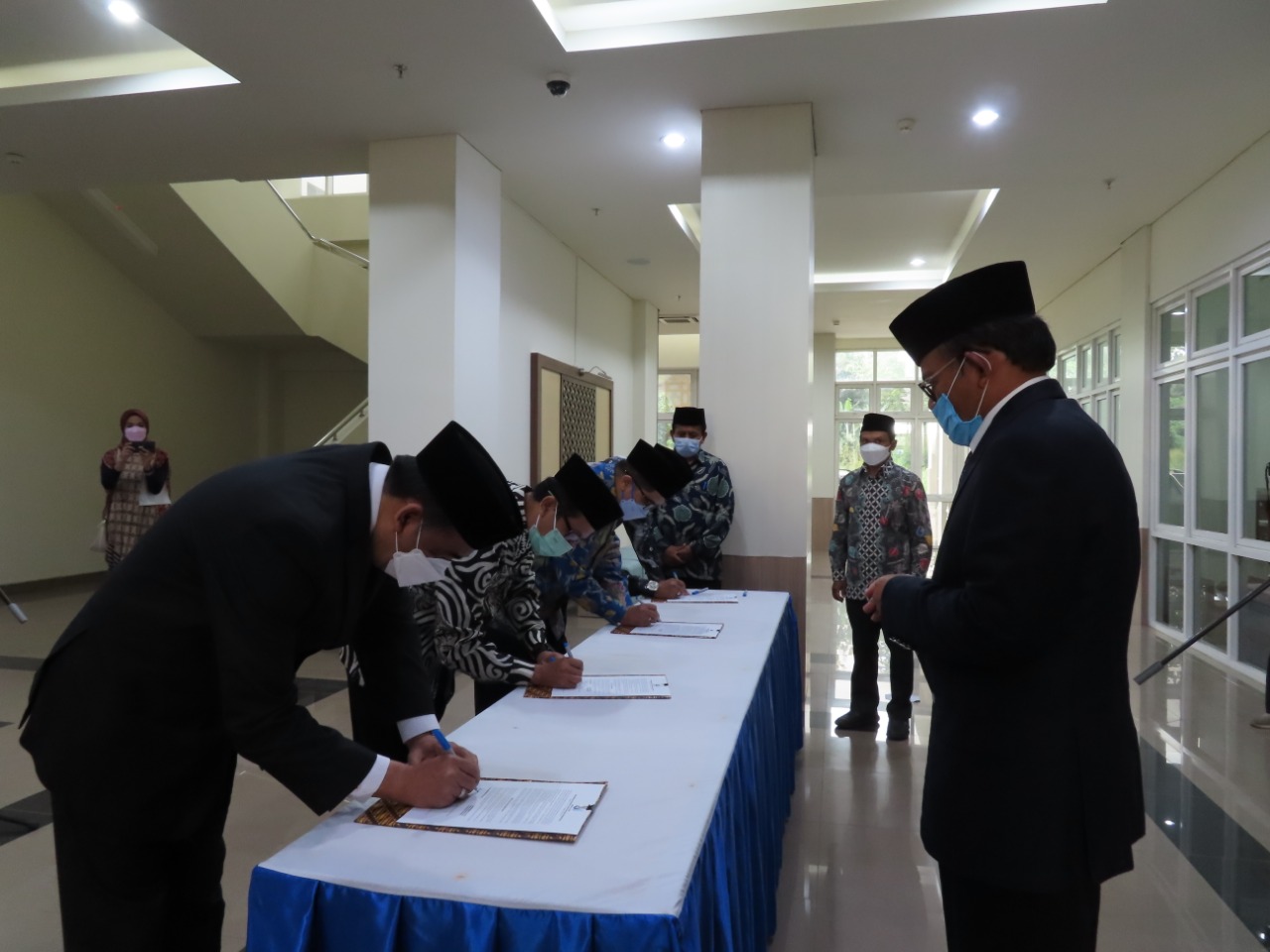Tips to Win UIII Scholarship from the Faculty's Top Officials
May 08, 2023Contributors: Maroof Ahmed, Atia Adjani, Fatima Zahra | Editor: Supriyono

In line with its mission to offer quality education with international standards, the Universitas Islam Internasional Indonesia (UIII) has opened its doors for both local and international students to pursue MA and PhD programs under the fully funded scholarship scheme.
As the deadline draws closer, we have interviewed respected authorities from UIII's four faculties to provide valuable tips to help students stand out in their selection process. Below are the compilations of our interview results.
Prof. Nina Nurmila, Dean of the Faculty of Education
- What qualities are you looking for in a potential scholarship recipient from the Faculty of Education?
Firstly, intellectual readiness for pursuing an MA in Education is crucial. This can be gauged from a high GPA of at least 3.0. It is preferable that the applicant has an educational background in the Faculty of Education to ensure familiarity with the subject matter. While I support multidisciplinary approaches, it is important to maintain a certain degree of linearity in one's educational background, rather than jumping from unrelated disciplines like medicine to education.
Secondly, a strong educational background is essential, along with meeting the minimum TOEFL score requirement of 550. This ensures that applicants can effectively use English as a medium of instruction and actively participate in their education.
The application process begins with the submission of documents, such as a letter of interest. This letter should demonstrate a strong connection to the Faculty of Education and showcase the applicant's desire to further expand their knowledge from their undergraduate studies. For PhD applicants, a research proposal is required, highlighting the intended research focus for their dissertation.
- What role does prior experience in education-related activities or volunteering play in the selection process?
It is highly advantageous for applicants to have prior experience in education-related activities or volunteer work. This added value distinguishes them from other applicants who may lack such experiences. The relevant experience will be advantageous in order to be more competitive compared to other applicants.
In summary, we are looking for candidates who possess intellectual readiness, a strong educational background, a minimum TOEFL score of 550, relevant experience in education-related activities, and a clear research focus for PhD applicants.
Fajar B. Hirawan, Faculty of Economics and Business
- How can applicants best demonstrate their potential for success during the application and interview process?
Qualities that scholarship committees may look for in potential recipients from the Faculty of Economics and Business may include:
Academic excellence: A solid academic record is often essential to scholarship selection. This may include high grades, academic awards, and other academic achievements.
Leadership potential: Many scholarship programs are looking for students who have the potential to become leaders in their field. This may include demonstrated leadership skills or experiences, such as serving as student club president or volunteering in a leadership role.
Community involvement: Scholarship committees may also look for students who are involved in their community or have a strong commitment to service. This could include volunteering, participating in community service projects, or working on social justice initiatives.
Career aspirations: Scholarship committees may be interested in students with a clear vision for their future careers and how the scholarship will help them achieve their goals.
- What types of extracurricular activities/experiences do you value when considering candidates for the scholarship?
Share specific experiences or activities demonstrating your passion for education and teaching. This could include volunteer work, tutoring, or teaching assistant positions.
Highlight any teaching-related courses you have taken or any certifications you have earned that demonstrate your commitment to teaching and education.
Explain how you plan to use the scholarship to further your education and teaching goals. This could include pursuing a degree in education or economics, attending conferences or workshops on teaching methods, or developing new teaching materials.
The role of prior experience in education-related activities or volunteering in the selection process can vary depending on the scholarship program. In general, having expertise in education-related activities or volunteering can be viewed positively by scholarship committees, as it demonstrates a commitment to the field and a desire to learn and grow as a teacher or educator.
However, it is essential to note that this is just one factor that scholarship committees may consider when selecting recipients, and it may not be the only factor.
Dr. Sirojuddin Arif, Head of MA in Political Science, Faculty of Social Sciences
- In your opinion, what qualities and experiences make an applicant an ideal candidate for the UIII scholarship in political science?
Other than [having a] critical and open mind, it would be good if applicants have some experience dealing with politics in the broad sense of the word. These experiences can be obtained in a variety of ways. It can be from work or internship at government agencies or legislature, advocacy works with NGOs or other types of social or political activism, journalist reports or investigation, research on political or public issues, or other relevant activities. Such experience can help develop good social and political imagination, which is needed by students or even professors to study or think about politics.
- How can applicants demonstrate their understanding of and commitment to political studies during the application and interview process?
They can demonstrate their good understanding of or commitment to political studies in the statement of purpose that every applicant is required to submit. Or, if you are a PhD student, you can indicate your good understanding of politics in the research proposal that you submit along with other application materials. You should develop good research questions about political problems that you are interested in and justify why these are important questions. You may also need to indicate why or how addressing these questions can make an important theoretical contribution to our understanding of politics. You may also talk about your knowledge or experiences in dealing with politics during the interview, especially when you have an opportunity to talk about it (when you are asked about why are interested in applying for a study or scholarship, or asked about your research interests)
- Can you suggest any specific topics or issues that applicants should be prepared to discuss during their interview?
Any topic may do, as long as you have a good understanding of the topic and how it relates to politics.
Dr. Bhirawa Anoraga, Faculty of Islamic Studies
- What are the key factors that make a candidate stand out in their application and interview for the Faculty of Islamic Studies?
The key factors that can make a potential student stand out in their application and interview for the Faculty of Islamic Studies include:
Academic Qualifications: The Faculty of Islamic Studies looks for students who have a strong academic background in Islamic Studies, either classical Islam and/or studies on Muslim societies. Therefore, having excellent grades and a proven track record of academic excellence is a major advantage.
Interest and Passion: Demonstrating a genuine interest and passion for the subject matter is crucial in the application and interview process. A student who has attended conferences or seminars, or undertaken research related to Islamic Studies shows their commitment and interest in the field.
Language skills: Fluency in English and Arabic is an asset for a student, as it enables them to engage with primary sources and research material in their original language.
Relevant Experience: Relevant work experience or community engagement, such as volunteering at an Islamic center or participating in interfaith dialogues, can demonstrate a student's commitment and connection to the field.
- How important is it for applicants to showcase their commitment to the study of Islam and its application in the modern world?
Demonstrating commitment to the study of Islam and its application in the modern world is essential for potential students applying to the Faculty of Islamic Studies. Islamic Studies is a field that is focused on the study of Islam and Muslim societies. Students who demonstrate a commitment to this field show that they are serious about their academic pursuits and are passionate about the subject matter. Moreover, their commitment to the study of Islam and its application in the modern world demonstrates their ability to engage with contemporary challenges facing the Muslim community and their eagerness to seek solutions.
In addition, showcasing a commitment to the study of Islam and its application in the modern world demonstrates a student's potential to make a positive impact in their communities and beyond. The study of Islam and its application in the modern world has the potential to address some of the most pressing issues facing Muslims and non-Muslims today, such as interfaith dialogue, social justice, and human rights. Therefore, students who demonstrate a commitment to this field can showcase their potential to make a difference in these areas.
- What types of experiences or achievements should applicants highlight when applying for the scholarship in this faculty?
When applying for a scholarship in the Faculty of Islamic Studies, potential students should highlight experiences or achievements that demonstrate their academic excellence, commitment to the field of Islamic Studies, and potential to make a positive impact in their communities and beyond. Here are some types of experiences or achievements that potential students should highlight:
Academic Achievements: Potential students should highlight their academic achievements, including excellent grades, honors, awards, and other recognitions. Any research projects or papers that they have completed or presented at conferences should also be highlighted.
Research and Writing Skills: Students who have conducted research, written papers, or published articles related to Islamic Studies should showcase their research and writing skills. This can demonstrate their potential to conduct high-quality research and contribute to the field of Islamic Studies.
Community Involvement: Highlighting any involvement in community initiatives, such as volunteering in community service projects, or organizing events that promote interfaith dialogue or social justice can showcase a student's commitment to their community.
Language Proficiency: Fluency in Arabic and English is an asset for students in the Faculty of Islamic Studies. Highlighting the language proficiency, including IELTS or TOEFL and TOAFL scores, language courses taken, or any relevant immersion experiences, can be advantageous.
Professional Experience: Relevant professional experience, such as working at a non-profit organization or participating in an internship program related to Islamic Studies, can demonstrate a student's ability to apply their knowledge and skills in real-world contexts.
- Dr. Nia Deliana Navigates India-Indonesia Maritime Softpower at Odisha Research Workshop
- UIII Extends Application Deadline for 2025 International Admissions
- UIII Embraces a Green Ramadan: A Month of Worship and Sustainability
- UIII Evaluates Quality Assurance System, Plans For New Study Programs
- Lost at Sea: UIII’s Dr. Nia Deliana Reveals the Silent Crisis of Sea Refugees
- The Qur’an in a Changing World: Prof. Sahiron Syamsuddin’s Visionary Lecture at UIII
- A Shared Mission of UIII and ICRC in Advocating International Humanitarian Law
- Hartford International University for Religion and Peace Signs MOU with UIII for Future Academic Partnership
- Professor Dian Masyita Honored as a Changemaker in Empowering Communities
- Bridging the Archipelago and the Nile


